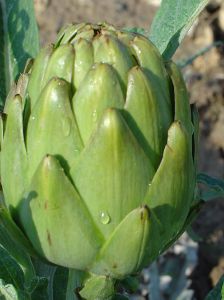 Native to the Mediterranean region, the artichoke is the edible flower bud of a thistle-like plant in the sunflower family. While its thorny leaves may deter us from approaching it; a treasure lies at its heart.
Native to the Mediterranean region, the artichoke is the edible flower bud of a thistle-like plant in the sunflower family. While its thorny leaves may deter us from approaching it; a treasure lies at its heart.
Although artichokes have been eaten for more than 3000 years. California produces 100 percent of the U.S. commercial artichoke crop, rivaled in popularity only in France and Italy.
Artichokes are a good dietary source of phosphorus, magnesium, iron, niacin, vitamin B1 and vitamin B2, and includes some folate, manganese, and zinc. Artichokes have been shown to have antioxidant, anti-fungal, anti-genotoxic, liver-protective and hypoglycemic activities, as well as reducing cholesterol and ameliorating indigestion and irritable bowel syndrome.
There are over 200 scientific articles on artichoke or one of its phytochemical. Researchers at the University of Georg-August in Germany showed that one of its phytochemical interfered with estrogen receptor which promoted the secretion of PSA in prostate cancer. Furthermore, this functional food possesses the ability to inhibit the angiogenesis related to cancer. Other studies demonstrated anti-proliferation and apoptotic proprieties and also inhibit inflammation.
In 2008, scientists from Rome showed that the edible parts of the artichoke had a “marked antioxidative potential” that protects normal liver cells from oxidative stress. It also reduced the viability of cancer cells and led to their programmed cell death, or apoptosis. (Miccadei S, Di Venere D, Cardinali A, et al. Antioxidative and apoptotic properties of polyphenolic extracts from edible part of artichoke (Cynara scolymus L) on cultured rat hepatocytes and on human hepatoma cells. Nutr Cancer. 2008;60:276-283)
Artichoke extract has been shown to inhibit proliferation and induce apoptosis in triple negative breast cancer cells in the laboratory. Flavone components of artichoke (apigenin and luteolin) have been shown to induce apoptosis across a variety of breast cancer cell lines.
So, artichoke seems like a healthy veggie choice!
You can simply steam or add artichokes to stews, but for those who can't do that every day and want a more consistent ingestion, there are supplements made from concentrated leaf extract. They are not expensive: on the Internet they sell for 5 to 10 cents per capsule.
A standard dose has not been established, but in studies on indigestion patients have taken one to two 320 mg capsules three times per day, preferably with meals.
Resources:
1. Nutr Cancer. 2008;60(2):276-83. Antioxidative and apoptotic properties of polyphenolic extracts from edible part of artichoke (Cynara scolymus L.) on cultured rat hepatocytes and on human hepatoma cells. Miccadei S, Di Venere D, Cardinali A, Romano F, Durazzo A, Foddai MS, Fraioli R, Mobarhan S, Maiani G. 2. Phytother Res. 2008 Feb;22(2):165-8. Growth inhibitory effect of ethyl acetate-soluble fraction of Cynara cardunculus L. in leukemia cells involves cell cycle arrest, cytochrome c release and activation of caspases. Nadova S, Miadokova E, Mucaji P, Grancai D, Cipak L.
~ Be Well. ♥